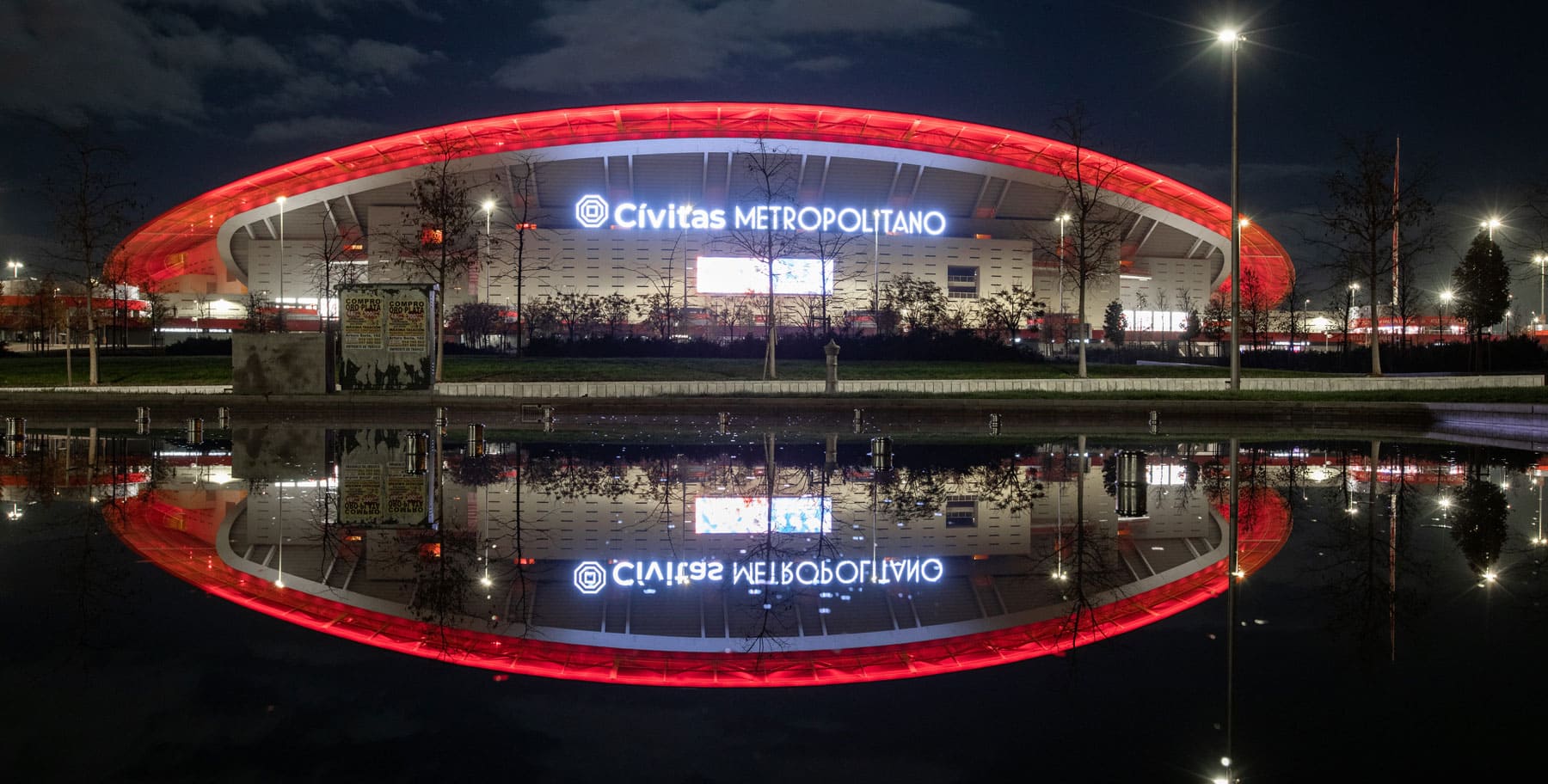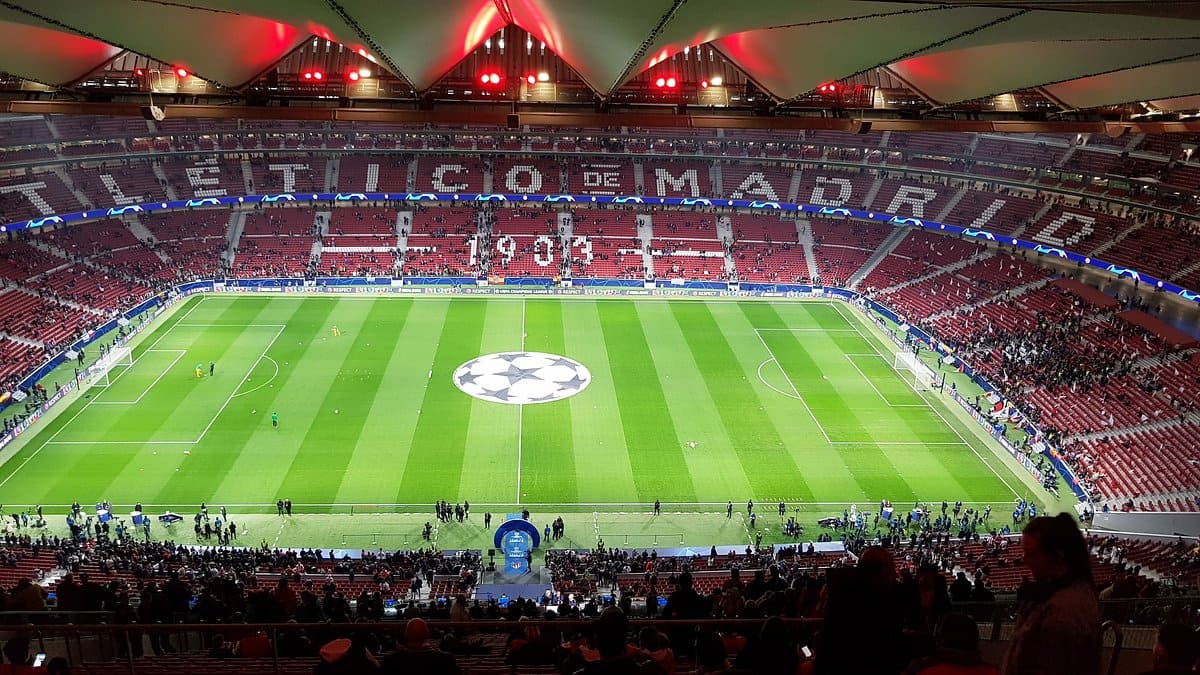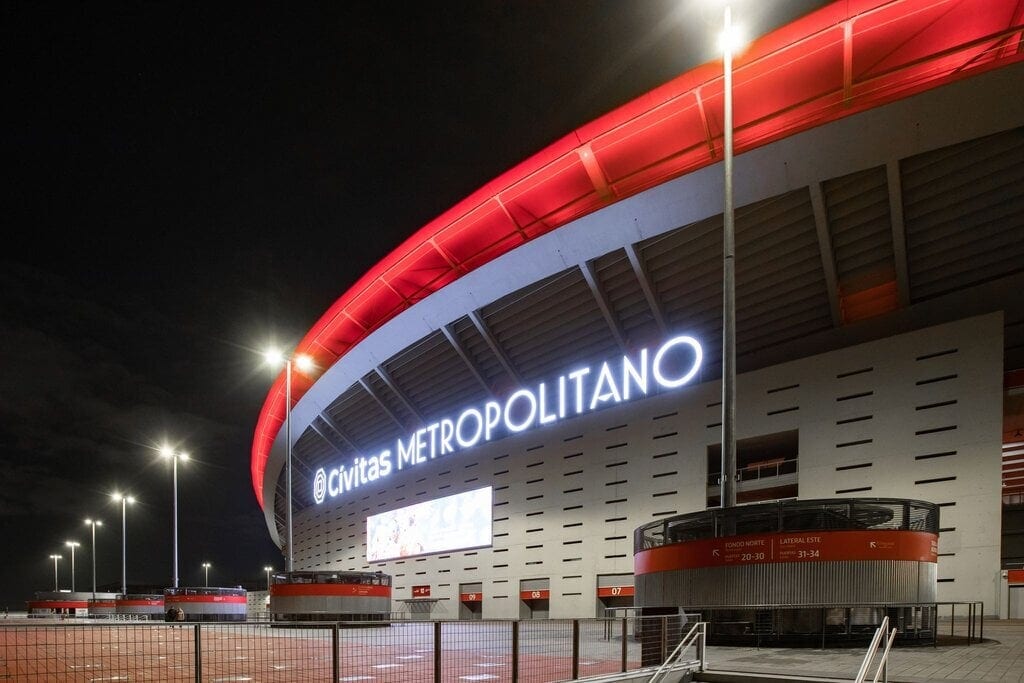

Metropolitano Stadium: A Modern Icon in Madrid

Metropolitano Stadium, officially known as Cívitas Metropolitano due to sponsorship agreements, is a prominent football stadium located in Madrid, Spain. Since the 2017–18 season, it has been the home ground of Atlético Madrid. The stadium is situated in the Rosas neighborhood, part of the San Blas-Canillejas district.
History and Development
The stadium was originally built to support Madrid’s attempt to host the 1997 World Athletics Championships. It opened its doors on September 6, 1994, under the ownership of the Community of Madrid. Unfortunately, it was closed in 2004 following the city's unsuccessful bid to host the 2016 Olympics. Eventually, the stadium became the property of Atlético Madrid in 2013. After an extensive renovation, the stadium reopened on September 16, 2017, for Atlético Madrid's match against Málaga. The transformation expanded the seating capacity from 20,000 to 68,456, which was later adjusted to 70,460 by September 2023.
Major Events
One of the most notable events held at the Metropolitano was the 2019 UEFA Champions League Final on June 1, 2019. Looking ahead, the stadium is considered a potential venue for the 2030 FIFA World Cup.
Evolution of the Name
Throughout its history, the stadium has been referred to by various names. Initially, it was known as Estadio de la Comunidad de Madrid and Estadio Olímpico de Madrid. However, it earned the nickname La Peineta (The Comb Stadium) due to the design's resemblance to a traditional comb. In 2016, the Wanda Group, a Chinese real estate company, acquired the naming rights. After their deal expired at the end of the 2021–22 season, Cívitas Pacensis, a real estate firm, became the new sponsor. However, in UEFA materials, the stadium continues to be referred to as Estadio Metropolitano due to sponsorship regulations.
Early Days and Legacy
Construction began in 1990, following a design by the firm Cruz y Ortiz. The stadium was completed by November 1993, with a total investment of €45 million. It was inaugurated by prominent figures, including IOC President Juan Antonio Samaranch, Madrid’s president Joaquín Leguina, and Madrid’s mayor José María Álvarez del Manzano. Known for its single-tier seating and capacity of 20,000, the stadium became known for its role in hosting smaller sports and cultural events throughout its early years.
Transition to a Football Stadium

In 2004, the stadium was closed with the intention of using it for future Olympic bids. Despite multiple failed bids for the 2012 and 2016 Olympics, negotiations continued for the stadium's future. In December 2008, an agreement between Atlético Madrid's president Enrique Cerezo and Madrid’s mayor Alberto Ruiz-Gallardón set the groundwork for Atlético’s eventual move to the stadium. Although the move was initially planned for 2013, economic factors delayed progress.
Following Madrid’s third failed Olympic bid in 2013, Atlético Madrid officially took control of the stadium. Renovation work, including the removal of the athletics track and seating modifications, led to the creation of the modern Metropolitano Stadium, a true home for Atlético Madrid and a venue for world-class events.
The newly revamped Metropolitano Stadium was scheduled to replace the iconic Vicente Calderón Stadium as Atlético Madrid’s home in time for the 2017–18 season. On 9 December 2016, the club revealed that the stadium’s official name would be Wanda Metropolitano, with Wanda reflecting the sponsorship and Metropolitano honoring the club’s historic stadium from 1923 to 1966, which was Atlético’s home before Vicente Calderón.
In March 2017, Atlético Madrid officially purchased the stadium from the Madrid City Council for a reported fee of €30.4 million. By mid-April 2017, the club had reserved approximately 48,500 season tickets for enthusiastic supporters.
Inaugural Match and Memorable Firsts
On 17 September 2017, the Estadio Metropolitano hosted its inaugural match during the 2017–18 La Liga season, with Atlético Madrid facing off against Málaga CF. The event was graced by the presence of King Felipe VI of Spain. Antoine Griezmann etched his name into the stadium’s history by scoring the first goal in the 1–0 victory for Atlético.
Just ten days later, on 27 September 2017, the stadium hosted its first European fixture. In a stunning performance, Chelsea defeated Atlético Madrid 2–1, becoming the first English team to win at Atlético’s new home in European competitions and marking the stadium’s first-ever loss for the home side.
Notably, the Metropolitano became the world's first fully LED-lit stadium, enhancing the venue’s modern and eco-friendly reputation.
Key Events at Metropolitano Stadium
Prior to its transformation, the stadium, then known as La Peineta, hosted a variety of important events. On 28 August 1996, the venue saw Atlético Madrid defeat FC Barcelona 3–1 in the second leg of the Supercopa de España, though they lost on aggregate. Additionally, during the 1997–98 Segunda División season, local club Rayo Vallecano temporarily played home matches at La Peineta while their regular stadium, Campo de Fútbol de Vallecas, was under renovation.
La Peineta also hosted international sporting events, including the 9th IAAF World Cup on 21–22 September 2002, an elite track and field event sponsored by the International Association of Athletics Federations (IAAF).
Champions League and National Team Appearances
Shortly after the stadium’s grand opening in 2017, UEFA selected the Metropolitano to host the 2019 UEFA Champions League Final, which took place on 1 June 2019. This marked the fifth time Madrid had hosted a Champions League final, but the first at Atlético’s new home, as previous finals were held at Real Madrid’s Santiago Bernabéu Stadium.
On 27 March 2018, the Metropolitano welcomed Spain’s national football team for the first time in a friendly match against Argentina. The game ended in a resounding 6–1 victory for Spain.
Another significant event occurred on 21 April 2018, when the Metropolitano hosted the 2018 Copa del Rey Final. Barcelona triumphed over Sevilla with a commanding 5–0 scoreline. One of the memorable moments of the match was when Andrés Iniesta received a standing ovation as he was substituted, playing his final Copa del Rey match for Barcelona.

Record-breaking Women’s Match and Recent Events
On 17 March 2019, the stadium made history in women's football by hosting a league match between Atlético Madrid and Barcelona, which drew a record-breaking crowd of 60,739 spectators, setting a new global attendance record for a women’s football match between clubs.
The Metropolitano continues to be a key venue for world-class events, including concerts. On 1 June 2022, the stadium hosted The Rolling Stones as part of their Sixty tour, and on 18 July 2023, The Weeknd performed there during the European leg of his After Hours til Dawn tour. Additionally, from 2024 to 2026, the stadium is set to host the final of the World Rugby Sevens Series, further cementing its status as a premier multi-purpose venue.
A tripartite agreement between Madrid City Council, the Spanish Ministry of Public Works and Transport, and Atlético Madrid was established to enhance access routes to the stadium. The initial phase, scheduled for completion prior to the stadium’s opening, included several key infrastructure upgrades. These involved creating a new entrance from the M-40 highway leading to Avenida Luis Aragonés, improving the connection between the Eisenhower Knot (where M-14 and M-21 merge) and the service road to the stadium, enhancing the entrance via Arcentales Avenue, building an additional vestibule, and improving access to the Estadio Metropolitano Metro station. These improvements were financed by the club, with a total cost nearing €30 million.
Phase Two: Future Transport Plans
The second phase, slated to occur post-inauguration, included further transportation developments. As announced by the Ministry of Public Works and Transport, the highlight of this phase is the opening of the O'Donnell Cercanías Madrid station. This new station will transform the current stop into a central transport hub for the Rejas neighborhood. It will be situated at the intersection of the M-21 dual carriageway and M-40 highway, near Ciudad Pegaso and the Plenilunio Shopping Center, conveniently close to the Wanda Metropolitano.
To further streamline traffic flow and accommodate the anticipated surge in visitors, the City Council is engaging in discussions with the Community of Madrid and the Ministry of Public Works. Their proposals include extending Metro line 2 to connect with the new O'Donnell Cercanías station, as well as linking it with the existing line 7 at Estadio Metropolitano station, which features the largest platform within the Metro network.
Alternative Public Transportation Options
Fans and visitors can also access the stadium from three additional Metro stations, which range from a 2 to 20-minute walk away. These stations include Las Rosas (line 2), Canillejas (line 5), and Las Musas (line 7).
Furthermore, multiple EMT Madrid buses have stops near the stadium. These lines include 28, 38, 48, 140, 153, E2, and the nocturnal buses N5 and N6. For longer distances, visitors can use buses 286, 288, and 289. On match days, the EMT operates a special shuttle service, the SE721 line, running directly from the Canillejas exchanger to the stadium. Canillejas station also offers connections to Metro line 5 and other bus routes, including 77, 101, 140, 151, and 200.
